







Timeline Of Events 1948 - 1998 |
1948 - 1949 - 1950 - 1951 - 1952 - 1953 - 1954 - 1955 - 1956 - 1957 1958 - 1959 - 1960 - 1961 - 1962 - 1963 - 1964 - 1965 - 1966 - 1967 1968 - 1969 - 1970 - 1971 - 1972 - 1973 - 1974 - 1975 - 1976 - 1977 1978 - 1979 - 1980 - 1981 - 1982 - 1983 - 1984 - 1985 - 1986 - 1987 1988 - 1989 - 1990 - 1991 - 1992 - 1993 - 1994 - 1995 - 1996 - 1997 1998 Israel Celebrates Its 50th Anniversary |
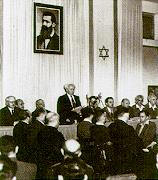
(Israel Government Press Office)
David Ben-Gurion declares the establishment of the State of Israel (May 14).
Israel is immediately recognized by the US and the USSR, followed by other countries.
War of Independence begins (15 May) as the armies of Egypt, Syria, Jordan and Lebanon and a contingent from Iraq invade the new state; Jerusalem is besieged and a new road - nicknamed the Burma Road - is constructed to circumvent the original road; Jordan captures Jewish settlements in Gush Etzion, the northern Dead Sea area, and north of Jerusalem, as well as the Jewish Quarter of Jerusalem's Old City; in 15 months of intermittent fighting, all invaders are repulsed.
Israel Defense Forces (IDF) is founded, incorporating all the pre-state defense organizations.
First census finds a population of 872,700 - 716,700 Jews and 156,000 non-Jews.
Israeli lira replaces British pound as official currency, with identical value.
Mass immigration from post-war Europe and Arab countries begins; in the years 1948-52, immigration was to bring 687,000 persons to Israel's shores, doubling its Jewish population.
Count Bernadotte, UN-appointed mediator, is assassinated in Jerusalem. The Altalena, a ship of the underground defense organization Etzel, is sunk off the shore of Tel Aviv by IDF guns.
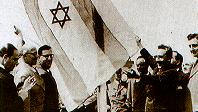
First Knesset (parliament) elections (25 January); David Ben-Gurion heads a Labor-led coalition government; until 1977 all governments will be headed by the Labor Party.
First Knesset meets in Jerusalem.
Chaim Weizmann is elected Israel's first president by the Knesset.
Umm Rashrash, today Eilat, is captured by the IDF; a makeshift flag, drawn with ink, is raised.
Jerusalem is declared capital of Israel.
Israel admitted to the United Nations as its 59th member.
The Weizmann Institute of Science is inaugurated in Rehovot.
Armistice agreements are signed with Egypt, Jordan, Syria and Lebanon.
Jerusalem is divided between Israel and Jordan, with Jordan controlling the Old City and east Jerusalem, and Israel controlling the western and southern parts of the city.
The tzena, rationing of food and other necessities.
First ulpan - special classes for intensive teaching of Hebrew - is opened.
Operation Magic Carpet - aliya of Jews from Yemen - begins.
Theodor Herzl, the father of Zionism, who died in 1904 and was buried in Vienna, is reinterred in Jerusalem.
Israel's population exceeds one million.
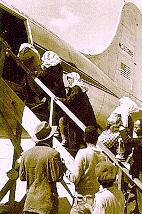
The Knesset and most government ministries move to Jerusalem;
the Knesset convenes in temporary quarters until the completion of its permanent home in 1966.
Operation Ezra and Nehemiah, bringing Jews to Israel from Iraq, begins.
First ma'abara, temporary camp for new immigrants, is established.
The Law of Return, granting Jews the right to come to Israel as olim (immigrants) and become citizens, is passed by the Knesset.
Great Britain recognizes the State of Israel.
The Eilat port is opened.
The Nazis and Nazi Collaborators (Punishment) Law is passed by the Knesset.
A seamans' strike paralyzes Israel's ports for many months.
The Hula valley reclamation project, turning swampland into arable land, begins.
An incident in El-Hama starts a series of clashes with Syria.
Elections to the Second Knesset.
The Zionist Congress convenes in Jerusalem for the first time.
Egged bus transport cooperative is formed.
Split in the kibbutz movement.
Reparations agreement with Germany is signed, despite protest demonstrations.
Yitzhak Ben-Zvi is elected Israel's second president, after the death in office of President Chaim Weizmann.
Israel participates in the Olympic Games (in Helsinki) for the first time.
Operation Coresh - immigration of Iranian Jewry.
The First Zimriya, a triennial choral festival bringing choirs from all around the world, opens.
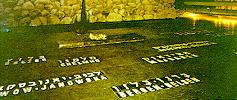
Yad Vashem (Israel's Holocaust memorial) is established in Jerusalem.
Ministry of Foreign Affairs is moved to Jerusalem.
Security situation on border with Jordan worsens; many infiltration incidents.
Diplomatic relations between Israel and the USSR are broken off.
Moshe Dayan is appointed Chief of General Staff of the IDF.
The Academy of the Hebrew Language, which guides the formal linguistic development of Hebrew, is founded.
The Society for the Protection of Nature in Israel, dedicated to the protection and conservation of nature and the environment in Israel, is established.
Prime Minister David Ben-Gurion retires to Kibbutz Sde Boker.
Moshe Sharett becomes prime minister.
Egypt stops Israeli freighter, Bat Galim, from passing through the Suez Canal, in contravention of the armistice agreement.
Israeli intelligence fiasco in Egypt causes a scandal (Esek Bish) which continues for nearly a decade and forces Israel's Minister of Defense, Pinchas Lavon, to resign.
Immigration from North Africa accelerates amid growing anti-Semitism in these countries.
Infiltrators from across the Jordanian border attack a bus at Ma'ale Akrabim in the northern Negev and murder 11 passengers.
A light plane crashes at a memorial ceremony for Jewish paratroopers in Europe during World War II, at Kibbutz Ma'agan Michael, killing 17.
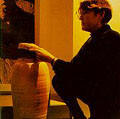
The four remaining Dead Sea Scrolls, acquired for the State of Israel by Prof. Yigael Yadin,
Oil is found in the Heletz oilfield in the Negev, but the quantity is small.
Elections for Third Knesset; David Ben-Gurion again becomes prime minister.
Bar Ilan University, with its emphasis on Jewish heritage studies, is opened in Ramat Gan.
Two Egyptian Jews are hanged after being convicted of spying for Israel.
Prime Minister of Burma U Nu pays an official visit to Israel - the first by any state leader.
Dr. Israel Kastner, a leader of Hungarian Jewry who later immigrated to Israel, is found guilty in a district court of collaboration with the Nazis during WWII.
Kiryat Gat is established in the Lachish area.
Bulgarian fighter planes down an El Al civilian airliner over Bulgaria; 58 killed.
Incursions of armed infiltrators across the border with Egypt increase, resulting in many casualties.
The Mafdal - National Religious Party - is established.
Golda Meir becomes minister of foreign affairs, replacing Moshe Sharett.
Nasser nationalizes the Suez Canal.
France gives Israel military aid.
Sinai Campaign is launched by Israel, parallel to a British and French operation, following an Egyptian blockade of the Straits of Tiran; in the course of the
fighting, Israel captures the Gaza Strip and the entire Sinai peninsula.
Tel Aviv University is opened.
IDF soldiers, contravening orders, open fire on Arab villagers in Kafr Kassem violating the curfew, killing 49; those responsible are given extended prison
sentences.
Israel withdraws from the Gaza Strip and the Sinai Peninsula, with assurances of free passage for its shipping through the Suez Canal.
The draining of the Hula swamp is completed, providing arable land and preventing malaria.
The Mann Auditorium is inaugurated in Tel Aviv.
Immigration from Eastern European countries - especially Poland and Hungary - as well as from Egypt, increases.
MASHAV Center for International Cooperation is established by the Ministry of Foreign Affairs to share development know-how.
The first International Bible Contest is held in Jerusalem.
The cornerstone for the Knesset building is laid in Jerusalem.
Egypt and Syria unite to form the United Arab Republic.
The Supreme Court finds Israel Kastner innocent of collaboration with the Nazis.
The Hebrew University campus at Givat Ram is inaugurated.
Israel's population exceeds two million.
The Employment Service is established.
Heichal Shlomo- seat of the Chief Rabbinate - is inaugurated.
Tzena (rationing) ends.
Elections for the Fourth Knesset.
A series of riots with an ethnic-socio-economic basis take place in the Haifa suburb of Wadi Salib.
The Navy's first submarine, the Tanin (crocodile), arrives in Haifa.
Habima is declared the national theater of Israel.
Hadassah Hospital and Hebrew University Medical School is inaugurated at Ein Karem in Jerusalem.
Israel Lands Authority is established to manage state and JNF lands.
Letters from the Bar Kochba archive (second century CE) are discovered in a dig in the Judean desert.
The National Commission for Space Research is founded.
Operation Yachin, bringing immigrants from Morocco to Israel, commences.
The Egoz, carrying immigrants from Morocco, sinks; 43 passengers drown.
The Shavit II, an experimental meteorological satellite, is launched.
Adolf Eichmann, organizer of the Nazi extermination program during World War II, stands trial in Jerusalem; he is found guilty and sentenced to death for crimes against humanity and the Jewish people, and is hanged in 1962.
Israel Ber, military historian and advisor to the Minister of Defense, is arrested for spying for the USSR and sentenced to 15 years in prison.
Elections for the Fifth Knesset.
Hai Bar - an project to reintroduce animals which once roamed the land of Israel to their former natural habitats - is begun; stations will be set up in the Arava and the Carmel forest.
Yerid Hamizrach, an international commercial fair opens in Tel Aviv; 33 countries participate.
An economic program which includes a large devaluation of the lira (Israel's currency) and the cancellation of subsidies on basic commodities lead
to inflation and a rise of the deficit in the balance of trade.
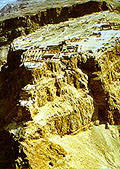
Pope Paul VI visits Israel; President Shazar receives him in Megiddo.
The Palestine Liberation Organization is founded.
The National Water Carrier, bringing water from the north and center of the country to the semi-arid south, is completed.
Ze'ev Jabotinsky, father of Revisionist Zionism, who died in 1940, is reinterred in Jerusalem.
Karmiel is established in the lower Galilee.
Yitzhak Rabin is chosen as Chief of General Staff.
The Nature Reserves Authority is founded.
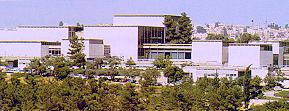
The PLO's first terror attack - an attack on the National Water Carrier - takes place.
Eli Cohen, an Israeli agent, is hanged in Damascus.
The Israel Museum in Jerusalem is founded as the country's national museum.
Teddy Kollek becomes mayor of Jerusalem; his term of office, after being re-elected six times, lasts 28 years.
Elections for the Sixth Knesset.
Israel and Germany establish diplomatic relations.
Neot Kedumim, a biblical landscape reserve, is founded.
The permanent Knesset building is inaugurated in Jerusalem.
Hebrew writer S.Y. Agnon is co-recipient of the Nobel Prize for literature.
Abie Natan, Israeli peace activist, flies to Egypt.
Coca Cola announces its plans to open a plant to produce Coca Cola in Israel, despite he Arab boycott.
An economic plan calling for less government spending and less private consumption leads to an excessive slowdown of the economy and mass unemployment.
Educational television broadcasts begin.
National unity government is formed to face massive military build-ups by the neighboring Arab states and an Egyptian blockade of the Straits of Tiran.
Six-Day War - Israel invokes its inherent right of self-defense by launching a preemptive strike; Judea, Samaria, Gaza, and Sinai peninsula come under Israeli
control; Jerusalem officially reunited under Israeli control; The Golan Heights are taken by Israel after fierce fighting against attacking Syrian forces.
Open Bridges policy across the Jordan River bridges, for goods and people, is instituted.
Sea-to-sea missiles fired from Egyptian missile boats near Port Said sink the Israeli destroyer Eilat; 47 are killed or missing
and presumed dead
UN General Assembly Resolution 242 adopted, providing an agreed framework for settling the Arab-Israel dispute.
Military government is established in administered areas.
Ben-Gurion University of the Negev is opened.
The submarine Dakar disappears on its maiden voyage in the Mediterranean.
Mapa, Ahdut Ha'avoda and Rafijoin join together to form the Israel Labour Party.
First television broadcasts.
Jews return to Gush Etzion, abandoned after its capture by the Jordanians in 1948.
Jews return to Hebron, abandoned in 1929 when over 60 Jews there were massacred and the rest of the Jewish community evacuated to Jerusalem.
Israel television broadcasts begin.
The PLO formulates its covenant, which negates the existence of Israel.
Palestinian terror attacks intensify, including the hijacking of an El Al plane from Rome to Algeria.
War of Attrition is initiated by Egypt and Jordan, causing heavy casualties on both sides.
A car bomb in the Mahane Yehuda market in Jerusalem kills 12, injures 70.
National Insurance Law is passed.
Prime Minister Levi Eshkol dies in office;
Golda Meir becomes prime minister.
Five French-built torpedo boats, purchased and paid for by Israel, are successfully brought from Cherbourg port to Haifa, despite French arms embargo.
Elections for Seventh Knesset; Golda Meir remains prime minister.
War of Attrition, sporadic military actions by Egypt along the Suez Canal, escalates until a renewed cease-fire is achieved.
Phantom planes acquired from the US arrive in Israel.
Twelve children from moshav Avivim are killed in a terrorist attack.
Refuseniks in the USSR are sentenced to death for hijacking an airplane.
Black September: clashes between Jordanian forces and the PLO, in an attempt by the PLO to take control of the country, end in Jordanian victory; the PLO regroups in Lebanon.
A series of hijackings of international airliners is perpetrated by Palestinian terrorists.
Israel's population exceeds three million.
Black Panthers, a radical protest movement of Israelis of mid-eastern and north African background, is active for some time; some of its members later enter politics.
Intensive American efforts to reach a settlement between Israel and Egypt bear no fruit.
Israel's consul-general in Istanbul killed by terrorists.
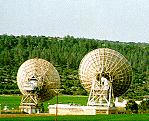
The IDF frees the hostages on a hijacked Sabena plane at Lod airport.
Three Japanese terrorists open fire at Lod airport, killing 25 and injuring 72.
Eleven Israeli athletes are murdered by PLO terrorists at the Munich Olympic Games.
Immigration from the USSR increases, totaling some 100,000 Jews in the 1970s.
The satellite communication station in Emek Ha'ela is opened.
A number of letter bombs are sent to Israeli embassies abroad; Israel's agricultural attache in London is killed.
A Libyan civilian plane is erroneously downed by the IDF in Sinai.
Ephraim Katzir becomes Israel's fourth president.
The Herut Movement and the Liberal Party join to form the Likud.
Israel's military attache in Washington killed by terrorists.
Yom Kippur War - on the Day of Atonement, the holiest day of the Jewish year, Egypt and Syria launch a coordinated surprise attack, repulsed by Israel
after fierce fighting and heavy losses.
UN General Assembly passes Resolution 338, calling for a settlement of the Arab-Israel conflict on the
basis of Resolution 242 of 1967.
David Ben-Gurion, first prime minister, regarded as the father of the State of Israel, dies.
Elections for the Eighth Knesset.
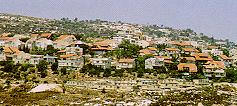
Golda Meir forms new government.
Agranat Commission, appointed to investigate the causes of the unreadiness and thus the
initial losses of the IDF during the Yom Kippur War; the commission concluded that the senior military officers, not the political leadership, was responsible.
Anti-government protest demonstrations take place.
Prime Minister Golda Meir resigns.
Yitzhak Rabin becomes prime minister.
Twenty-one youths are killed in terrorist attack in Ma'alot.
Separation-of-forces agreement signed with Egypt.
Disengagement agreement is signed with Syria.
Gush Minim, a movement claiming Jewish rights over historical Israel (advocating settling Judea and Samaria) becomes active.
The Open University, offering higher education opportunities with flexible methods, is opened.
First Arthur Rubinstein Piano Competition takes place.
The US-Israel Binational Science Foundation, to foster civilian research, is founded.
UN General Assembly Resolution 3375 equates Zionism with racism.
Israel signs treaty with EC, instituting a free trade area for industrial products and leading to a significant increase in trade.
Terrorists landing by sea attack Savoy Hotel in Tel Aviv; 3 IDF soldiers are killed in clash.
Suez Canal is reopened by Egypt after eight years.
Israel exhibits the Kfir, an aircraft designed and produced in Israel.
The Knesset passes law mandating direct elections of mayors and heads of local councils.
HIPPY - a home-based program for the educational enrichment of disadvantaged preschool children, starts operation.
The IDF frees hostages held captive in Entebbe, Uganda, who had been captured by terrorists during the hijacking of an airliner en route to Paris; the action is named Operation Jonathan , after Jonathan Netanyahu, an officer killed during the action.
Prime Minister Rabin resigns over domestic scandal.
Good Fence policy instituted between Israel and Lebanon.
Land Day is marked by Israeli Arabs for the first time; demonstrations and clashes with police, in protest over confiscation of Arab land, leave 6 dead.
Yigael Yadin establishes the Democratic Movement for Change.
Yad Sarah, an institution which loans medical equipment for free, is established.
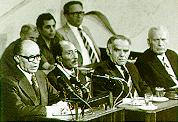
Elections for the Ninth Knesset - Likud party wins elections, ending 29 years of Labor party rule;
Menachem Begin becomes prime minister.
Egyptian President Sadat visits Jerusalem, breaking the cycle of Arab rejection of Israel.
Maccabi Tel Aviv basketball team wins European Championship.
Prime Minister Begin permits a group of Vietnamese boat refugees to enter Israel.
The US-Israel Binational Agricultural Research and Development Fund and the US-Israel Binational Industrial R&D Foundation, supporting R&D in their
respective fields, are founded.
Project Renewal, to improve the quality of life for inhabitants of distressed urban neighborhoods and towns, commences.
A bus is hijacked by terrorists on the coastal road; 35 passengers are killed.
Operation Litani - action against terrorist strongholds in southern Lebanon in response to attacks on civilians in northern Israel.
Peace Now movement is founded.
Diaspora Museum is opened in Tel Aviv.
Yitzhak Navon becomes Israel's fifth president.
Camp David Accords, constituting a basis for peace between Israel and Egypt, as
well as a basis for comprehensive peace in the Middle East, are signed by Israel and Egypt.
Prime Minister Begin and Egyptian President Sadat awarded Nobel Peace Prize for their efforts to bring peace to the Middle East.
Peace Treaty is signed with Egypt, ending a 30-year cycle of war.
El-Arish is returned to Egypt, in accordance with the peace treaty.
The United Kibbutz Movement is founded.
Embassy of Israel is opened in Cairo.
Basic Law: "Jerusalem, Capital of Israel" is passed by Knesset.
Inflation continues to soar; lira is replaced by shekel 1 shekel = 10 liras).
Israel continues its withdrawal from Sinai - including the Refidim air base.
The number of tourists arriving annually exceeds one million for the first time.
Israel's exports surpass $10 billion.

Maccabi Tel Aviv basketball team wins the European Championship for the second time.
Iraqi nuclear reactor is destroyed by the Israel Air Force, weeks before it is due to become operative.
Elections for the Tenth Knesset; Menachem Begin remains prime minister.
Memorandum of Understanding is signed with USA, forming the basis for civilian and military cooperation.
The Golan Heights Law is passed by the Knesset.
Attache at Israel's embassy in Paris killed by terrorists.
Israel completes withdrawal from Sinai in accordance with the Israel-Egypt peace treaty, despite widespread protest.
Israel's ambassador in London severely wounded by terrorists.
Operation Peace for Galilee is launched against PLO terrorist strongholds in Lebanon used for attacks against northern Israel; the IDF withdraws from Lebanon in 1985, retaining a presence in a security zone in southern Lebanon.
Hundreds of thousands of Israelis demonstrate against the war in Lebanon.
Christian Phalangist forces massacre Muslim refugees in Sabra and Shatilla in southern
Lebanon; Five months later, in February 1983, the Kahan Commission concludes
that while direct responsibility for the massacre lay with the Lebanese
Phalangist forces, Israel - especially naming Minister of Defense Ariel Sharon -
could have done more to prevent or limit the danger of revenge attacks.
The IDF headquarters building in Tyre is destroyed by a massive bomb; 75 killed.
Sha'are Tzedek Hospital, founded in 1902, inaugurates its modern new building in Jerusalem.
Israel's population exceeds four million.
A Peace Now activist is killed when a Jewish extremist throws a grenade at a Peace Now demonstration.
Chaim Herzog is elected sixth president.
Prime Minister Begin resigns; a new government headed by Yitzhak Shamir is formed.
A major stock exchange crisis threatens the economy as a whole.
A truck loaded with explosives in Tyre kills 60, Israelis and Arabs, and wounds dozens.
Terrorists take over a bus on its way from Tel Aviv to Ashkelon, killing one passenger.
Jewish underground operating in Judea and Samaria is uncovered and its members given prison. sentences ranging from 8 years to life; most are pardoned by the
President after several years in prison.
A concert of the music group Kaveret in Park Hayarkon draws a record crowd of 500,000.
Elections for the Eleventh Knesset; a national unity government is formed, with the rotation
of prime ministers; Shimon Peres becomes prime minister.
Operation Moses brings some 7,000 Jews from the ancient Jewish community of Ethiopia to Israel.
Israel Aircraft Industries unveils the first prototype of the Lavi fighter
plane; the program is discontinued in 1987 for budgetary reasons.
Free trade agreement is signed with the United States.
Over a thousand terrorists imprisoned in Israel are exchanged for three Israeli POWs from the war in Lebanon.
Israel withdraws from Lebanon, retaining a narrow security zone to protect northern Israel.
An emergency stabilization program put into effect by the government, succeeds in lowering annual inflation from 445% to 20%.
Administrative attache at Israel embassy in Cairo killed by terrorists.
The New Israeli Shekel replaces the shekel: NIS 1 = IS 1,000.
An Egyptian soldier opens fire on a group of Israeli tourists and kills 7.
Eilat becomes a free trade zone.
Jonathan Pollard is tried for spying for Israel in the US and sentenced to life imprisonment.
Tefen industrial park, a launching pad for start-up export industries with surroundings planned with environmental awareness, opens its gates.
Diplomatic relations established with Spain.
Anatoly (Natan) Sharansky, well-known refusenik in the USSR, arrives in Israel as a new immigrant.
Israel embassy employee in Cairo killed by terrorists.
Prime Minister Peres meets with King Hassan II in Morocco.
Ron Arad, Israeli Air Force navigator, is captured in Lebanon; his fate is still unknown.
Yitzhak Shamir becomes prime minister, as part of the rotation agreement signed in 1984.
An Israel interest office is opened in Warsaw, reestablishing limited diplomatic ties between Israel and Eastern Europe.
The first liver transplant in Israel takes place.
The trial of John Demjanjuk, accused of murdering Jews during World War II, opens in
Jerusalem; he is found guilty but later acquitted on appeal for lack of evidence.
Widespread violence (intifada) starts in the Israel-administered areas.
The Germany-Israel Foundation for Scientific Research and Development, supporting basic and applied research in areas of mutual interest, is founded.
Popular University, a project supplying higher education under municipal and regional auspices, begins.
The first heart transplant in Israel takes place.
Memorandum of Understanding is signed with the US, expanding cooperation between them.
Israel and the US begin cooperation on the production of the Arrow missile.
Elections for Twelfth Knesset; Yitzhak Shamir remains prime minister of national unity government.
Hundreds of dunams of forest are destroyed by fires set by intifada activists.
An Israeli Consulate is opened in Moscow.
Taba is returned to Egypt after international arbitration.
The New Israeli Opera opens its doors.
Sixteen bus passengers are killed on the Jerusalem-Tel Aviv highway as a terrorist gains
control of a bus and drives it over a cliff.
A Syrian pilot defects to Israel, landing a MIG-23 at Megiddo.
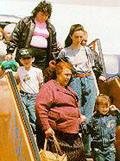
Mass immigration of Jews from the Soviet Union begins; within several years, more than 700,000 immigrants arrive.
The national unity government falls after a no-confidence vote; immediately thereafter, Labor party ministers resign; a new government of right-wing and
religious elements is formed.
The Israeli satellite Ofek 2 is launched into space.
First successful test of the Arrow missile.
Diplomatic relations with the USSR and other Eastern European countries are reestablished.
terror attack on Israeli tourists in Egypt kills 10.
Israel's GDP growth rises to some 6%; this will continue throughout the early 1990s.
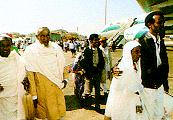
Israel is attacked by Iraqi Scud missiles during Gulf War.
Operation Solomon - most of the Jews remaining in Ethiopia, some 15,000, are brought to Israel in a massive airlift.
Middle East Peace Conference convenes in Madrid, bringing together representatives of Israel, Egypt, Jordan, Syria, Lebanon and the Palestinians.
UN General Assembly rescinds the resolution equating Zionism with racism.
Israel's population exceeds five million.
Israel and China establish diplomatic relations.
Knesset passes law providing for direct election of the prime minister, to go into effect from the elections for the Fourteenth Knesset (1996).
An attack on Israel's embassy in Buenos Aires leaves 29 dead and dozens wounded.
Elections for Thirteenth Knesset; Yitzhak Rabin of the Labor party becomes prime minister.
Benjamin Netanyahu is elected chairman of the Likud party.
Israel wins its first Olympic medals, silver and bronze in judo.
The new Supreme Court building.
Ezer Weizman is elected Israel's seventh president.
Operation Din Veheshbon - after continued Katyusha attacks on northern Israel, IDF
attacks Hizbullah bases in southern Lebanon.
Declaration of Principles on Interim Self-Government Arrangements is signed by Israel
and the PLO as the representative of the Palestinian people.
Diplomatic relations are established between Israel and the Holy See.
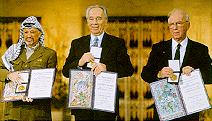
Jewish extremist kills 29 Muslim worshippers in Hebron.
suicide bomber blows up a bus in Tel Aviv, killing 24 and wounding dozens.
Gaza-Jericho Agreement between Israel and the PLO is signed in Cairo.
Israel-Jordan peace treaty is signed, establishing full diplomatic relations between the two states.
Morocco and Tunisia interest offices are opened.
Rabin, Peres and Arafat are awarded Nobel Peace Prize.
A series of suicide attacks in Jerusalem, Ashkelon and Tel Aviv kills over 60 Israelis.
Operation Grapes of Wrath against terrorist bases in Lebanon is launched.
IDF redeploys in Judea and Samaria, including redeployment from six cities.
Trade representation offices are established in Oman and Qatar.
Elections for Fourteenth Knesset and first direct elections for prime minister; Benjamin Netanyahu of the Likud party is elected prime minister.
Omani trade representation office opened in Tel Aviv.
The Western Wall Tunnel is opened to the public; violent Palestinian riots follow.
Israeli wins bronze medal in windsurfing competition at the Atlanta Olympics.
Israel's per-capita GDP - over $16,000 - places it 21st among 200 nations in he world;
exports of goods and services top $31 billion; gross investment - from Israel and abroad - totals $23.8 billion.
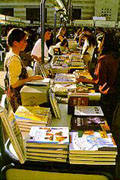
Protocol Concerning the Redeployment in Hebron signed between Israel and the PA.
The crash of two helicopters in northern Israel kills 73 soldiers.
Seven schoolgirls are murdered by a Jordanian soldier at Naharayim, on the border between Israel and Jordan.
Suicide bombers in Jerusalem kill 21 in two separate attacks.
Israeli wins silver medal at European Swimming Championship.
Industry continues to make international-level strides in medical electronics,
agrotechnology, telecommunications, fine chemicals, computer hardware and
software and diamond cutting and polishing, making Israel a leader in industry towards the 21st century.
Israel celebrates its 50th anniversary.
Israel Ministry Of Foreign Affairs.
http://www.mfa.gov.il/MFA/History/Modern+History/Israel+at+50/Timeline+of+Events-+Half+a+Century+of+Independence.htm#1976